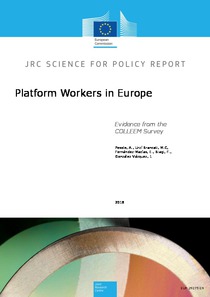Platform workers in Europe: evidence from the COLLEEM Survey
"The recent surge of digital labour platforms has led to new forms of work organisation and tasks distribution across the workforce. This has raised several questions about the functioning and the benefits deriving from the reorganisation of work that those platforms entail and the associated r...
| Main Authors: | , , , , |
|---|---|
| Institution: | ETUI-European Trade Union Institute |
| Format: | TEXT |
| Language: | English |
| Published: |
Luxembourg
2018
Publications Office of the European Union |
| Subjects: | |
| Online Access: | https://www.labourline.org/KENTIKA-19307585124911257679-Platform-workers-in-europe-evi.htm |
| _version_ | 1771659893505261570 |
|---|---|
| author | Pesole, Annarosa Urzí Brancati, Maria Cesira Fernández Macías, Enrique Biagi, Federico González Vázquez, Ignacio |
| author_facet | Pesole, Annarosa Urzí Brancati, Maria Cesira Fernández Macías, Enrique Biagi, Federico González Vázquez, Ignacio |
| collection | Library items |
| description | "The recent surge of digital labour platforms has led to new forms of work organisation and tasks distribution across the workforce. This has raised several questions about the functioning and the benefits deriving from the reorganisation of work that those platforms entail and the associated risks. The European Commission assessed online platforms in a May 2016 communication, focusing on both their innovation opportunities and regulatory challenges. In June 2016 the Commission also adopted its European Agenda for the Collaborative Economy, which clarified the concept and provided some guidance on the employment status of platform workers and the EU definition of worker. The European Pillar of Social Rights aims to address some of the policy challenges associated to new forms of employment, including platform work. As accompanying initiatives, the Commission presented in December 2017 a proposal for a new Directive on transparent and predictable working conditions, and in March 2018 a proposal for a Council Recommendation on access to social protection for workers and the self-employed. A crucial issue in designing the policy response to the emergence of digital labour platforms is the lack of reliable evidence. In 2017, the JRC conducted the COLLEEM pilot survey , an initial attempt to provide quantitative evidence on platform work, responding to calls by the European Council and the European Parliament. The survey provides a basis for an initial estimation of platform work in 14 Member States . How many platform workers are there in Europe? The COLLEEM survey contains a direct measure of service provision via platforms by the respondents in 14 EU Member States. ..." |
| format | TEXT |
| geographic | EU countries |
| id | 19307585124911257679_c70179f8c3fa40688eb88e9ad0a73db2 |
| institution | ETUI-European Trade Union Institute |
| is_hierarchy_id | 19307585124911257679_c70179f8c3fa40688eb88e9ad0a73db2 |
| is_hierarchy_title | Platform workers in Europe: evidence from the COLLEEM Survey |
| language | English |
| physical | 61 p. Digital |
| publishDate | 2018 |
| publisher | Luxembourg Publications Office of the European Union |
| spellingShingle | Pesole, Annarosa Urzí Brancati, Maria Cesira Fernández Macías, Enrique Biagi, Federico González Vázquez, Ignacio digitalisation crowd work labour force survey Platform workers in Europe: evidence from the COLLEEM Survey |
| thumbnail | https://www.labourline.org/Image_prev.jpg?Archive=138176895635 |
| title | Platform workers in Europe: evidence from the COLLEEM Survey |
| topic | digitalisation crowd work labour force survey |
| url | https://www.labourline.org/KENTIKA-19307585124911257679-Platform-workers-in-europe-evi.htm |

